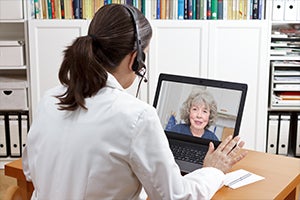

Coronavirus COVID-19: Telehealth and Virtual Care
See below for the latest information and resources for hospital and health system leaders related to telehealth and virtual care during the COVID-19 pandemic. For a comprehensive catalog of COVID-19 resources, visit the AHA's Updates and Resources on Novel Coronavirus (COVID-19) webpage.
Telehealth and Virtual Care Resources
Telehealth guidance by state during COVID-19
May 4, 2020
State emergency orders relevant to licensed psychologists during the COVID-19 public health crisis.
May 1, 2020
A new website to provide information about the latest federal efforts to support and promote telehealth services. It provides helpful information about telemedicine and links to tools and resources for practitioners. Accompanying the release, the Surgeon General released a blog directed to healthcare providers, urging them to join the telehealth revolution. He notes that healthcare providers have a unique opportunity to integrate telemedicine into their practice.
AHA Market Intelligence: Telehealth and Virtual Care Best Practices
May 21, 2020
In many cases, telehealth and virtual care can keep people safer at home and out of hospitals, doctors’ offices and urgent care by triaging those who have questions and need medical care, providing access to timely diagnosis and treatment, and monitoring patients with chronic conditions, while also limiting the person-to-person spread of COVID-19.
AHA Resource: Summary on Medicare Coverage and Payment for COVID-19 Virtual Care
April 18 , 2020
This executive summary from the AHA covers highlights from a recent CMS video providing answers to frequently asked questions about what types of virtual services Medicare covers, who can provide these services and how these services are billed.
Toolkit: CMS releases telehealth toolkits
CMS today released telehealth toolkits for general practitioners and providers treating patients with end-stage renal disease. Each toolkit links to sources of information on telehealth, such as how to initiate a telemedicine program, monitor patients remotely, develop documentation tools and other topics. They also outline temporary virtual services that could be used to treat patients during the COVID-19 pandemic.
Report: Strategies for Leveraging Telemedicine for COVID-19
This report in the New England Journal of Medicine examines Jefferson Health’s approach to telemedicine during the COVID-19 outbreak.
Recording: COVID-19 Call with Leaders from Providence St. Joseph Health System in Seattle (AHA Member Content)
March 24, 2020
Short summary and audio recording of virtual meeting where Providence shared insights on their digital response to COVID-19.
Advisory: 6 Digital Tactics Health Systems Can Implement This Week to Battle COVID-19
March 19, 2020
This advisory from AVIA Health offers tactics that can be implemented in days, not weeks, to help health systems during this crisis.
The AHA and the National Quality Forum have collaborated to produce Redesigning Care: A How-to Guide for Hospitals and Health Systems Seeking to Implement, Strengthen and Sustain Telebehavioral Health, which describes actionable strategies and interventions and links to a variety of other tools and resources. Whether a health care organization is starting a telebehavioral health program or strengthening an existing one, using this guide can provide better care to a large number of people who need behavioral health services, but don’t have access.
Healthcare Management Checklist for Teleworking Surge During the Covid-19 Response
April 1, 2020
This checklist is designed as a quick reference for health care enterprise management to consider important factors in a teleworking strategy that minimizes downtime and latency while supporting patient care, operational and IT security, and supply chain resilience.
Legislative News
AHA Advisory: CMS Broadens Access to Telehealth during COVID-19 Public Health Emergency
March 17, 2020
This document provides analysis several waivers and policy changes to broaden access to telehealth services for Medicare beneficiaries during the COVID-19 public health emergency.



